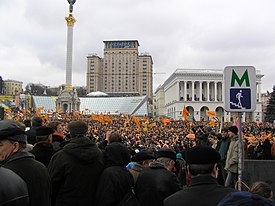| Orange Revolution | |||
|---|---|---|---|
| Part of the Colour Revolutions | |||
 Orange-clad demonstrators gather in the Independence Square in Kyiv on 22 November 2004. | |||
| Date | 22 November 2004 – 23 January 2005 (2 months and 1 day) | ||
| Location | |||
| Caused by |
| ||
| Goals | |||
| Methods | Demonstrations, civil disobedience, civil resistance, strike actions | ||
| Resulted in |
| ||
| Parties | |||
| Lead figures | |||
| Number | |||
| |||
| Casualties | |||
| Death(s) | 1 man died from a heart attack[5] | ||
| History of Ukraine |
|---|
 |
The Orange Revolution (Ukrainian: Помаранчева революція, romanized: Pomarancheva revoliutsiia) was a series of protests that led to political upheaval in Ukraine from late November 2004 to January 2005. It gained momentum primarily due to the initiative of the general population,[6] sparked by the aftermath of the 2004 Ukrainian presidential election run-off which was claimed to be marred by massive corruption, voter intimidation and electoral fraud.[7] Kyiv, the Ukrainian capital, was the focal point of the movement's campaign of civil resistance, with thousands of protesters demonstrating daily.[8] Nationwide,[9] this was highlighted by a series of acts of civil disobedience, sit-ins, and general strikes organized by the opposition movement.
The protests were prompted by reports from several domestic and foreign election monitors as well as the widespread public perception that the results of the run-off vote of 21 November 2004 between leading candidates Viktor Yushchenko and Viktor Yanukovych were rigged by the authorities in favour of the latter.[10] The nationwide protests succeeded when the results of the original run-off were annulled, and a revote was ordered by Ukraine's Supreme Court for 26 December 2004. Under intense scrutiny by domestic and international observers, the second run-off was declared to be "free and fair". The final results showed a clear victory for Yushchenko, who received about 52% of the vote, compared to Yanukovych's 44%. Yushchenko was declared the official winner and with his inauguration on 23 January 2005 in Kyiv, the Orange Revolution ended. In the following years, the Orange Revolution had a negative connotation among pro-government circles in Belarus and Russia.[11][12][13][14]
In the 2010 presidential election, Yanukovych became Yushchenko's successor as President of Ukraine after the Central Election Commission and international observers declared that the presidential election was conducted fairly.[15]
- ^ The Colour Revolutions in the Former Soviet Republics: Ukraine Archived 1 August 2017 at the Wayback Machine by Nathaniel Copsey, Routledge Contemporary Russia and Eastern Europe Series (page 30-44)
- ^ Ukraine profile Archived 12 October 2019 at the Wayback Machine, BBC News
- ^ Ukrainian Politics, Energy and Corruption under Kuchma and Yushchenko Archived 29 October 2013 at the Wayback Machine by Taras Kuzio, Harvard University (7 March 2008)
- ^ Cite error: The named reference
NYT20041126was invoked but never defined (see the help page). - ^ "Savik Shuster: I'm the only thing to remain after 'orange revolution'". Archived 23 September 2009 at the Wayback Machine. Novaya Gazeta, 2 February 2008
- ^ Kuzio, Taras (March 2007). "Oligarchs, Tapes and Oranges: 'Kuchmagate' to the Orange Revolution". Journal of Communist Studies and Transition Politics. 23 (1): 30–56. doi:10.1080/13523270701194839. ISSN 1352-3279.
- ^ Karatnycky, Adrian (2005). "Ukraine's Orange Revolution". Foreign Affairs. 84 (2): 35–52. doi:10.2307/20034274. ISSN 0015-7120. JSTOR 20034274.
- ^ Andrew Wilson, "Ukraine's 'Orange Revolution' of 2004: The Paradoxes of Negotiation", in Adam Roberts and Timothy Garton Ash (eds.), Civil Resistance and Power Politics: The Experience of Non-violent Action from Gandhi to the Present, Oxford University Press, 2009, pp. 295–316.[1] Archived 20 March 2017 at the Wayback Machine
- ^ Karatnycky, Adrian (15 September 2015). "Ukraine's Orange Revolution". Foreign Affairs: America and the World. ISSN 0015-7120. Archived from the original on 23 May 2020. Retrieved 28 May 2020.
- ^ Paul Quinn-Judge, Yuri Zarakhovich, The Orange Revolution Archived 23 July 2019 at the Wayback Machine, Time, 28 November 2004
- ^ Cite error: The named reference
MTimeswas invoked but never defined (see the help page). - ^ Cite error: The named reference
some of our opposition members were in Ukrainewas invoked but never defined (see the help page). - ^ Ukraine is Not Russia:Comparing Youth Political Activism Archived 16 May 2014 at the Wayback Machine by Taras Kuzio, Johns Hopkins University Press, 2006
(in Russian) «В оранжевых и радужных трусах» In orange and red shorts Archived 29 January 2013 at the Wayback Machine, Vzglyad (25 January 2013) - ^ Cite error: The named reference
LGBTNilovwas invoked but never defined (see the help page). - ^ Polityuk, Pavel; Balmforth, Richard (15 February 2010). "Yanukovich declared winner in Ukraine poll". The Independent. London. Archived from the original on 5 July 2018. Retrieved 7 September 2017.
"Viktor Yanukovych sworn in as Ukraine president". BBC News. 25 February 2010. Archived from the original on 5 July 2018. Retrieved 24 January 2011.